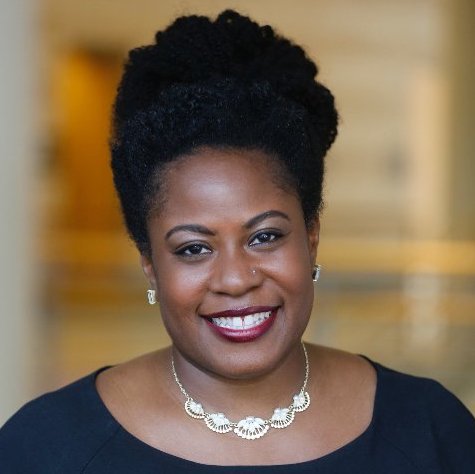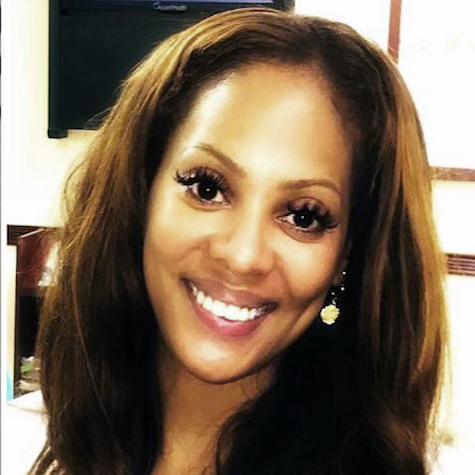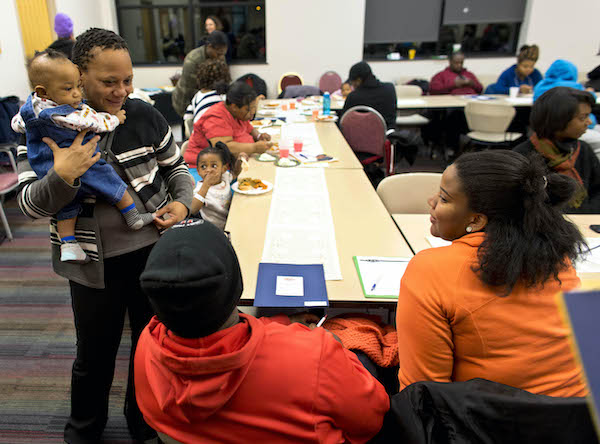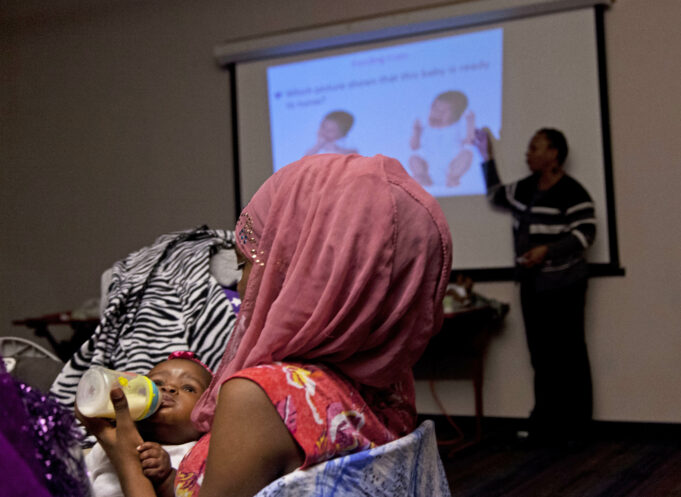Race major factor in saving Black babies and in comforting worried Black mothers
Infant mortality continues to be a growing issue within the Black community. A number of studies have highlighted staggering disparities between Black infant mortality and that of White infants.
But a new study published in the Proceedings of the National Academy of Sciences shows that Black newborns are more likely to survive if they are cared for by Black physicians.
While there has been much talk throughout the public health community as to whether race matters in the patient-provider relationship, this paper may be the first evidence to show that it does.

Dr. Rachel Hardeman 
Dr. Carletha Hughes
For Black mothers, this only further solidifies their desire to work with Black physicians.
Reports from the Centers for Disease Control and Prevention show in 2016, the Non-Hispanic Black infant mortality rate stood at 11.4 percent, while the Non-Hispanic White mortality rate stood at 4.9 percent.
Drs. Brad Greenwood and Rachel Hardeman, along with two other co-authors, dug deeper and discovered when Black newborns are the same race as the doctors who look after them, the mortality rate is cut in half.
When the race of the patient matches the race of the doctor––referred to as racial concordance––they found it to be associated with a “significant” improvement in mortality for Black babies.
Mr. Greenwood said this statistical improvement was persistent across the board––regardless of what kind of Black doctor treated the Black newborn.

“In this style of work, usually you try and find a relationship and you say oh okay, this relationship is there, like, can I break it?” said Mr. Greenwood, an associate professor at George Mason University in Virginia. “And no matter what we did, this thing’s just there. It’s like, if you look at pediatricians and non-pediatricians, Medicaid patients, self-insured patients, if you look across neonatologists, it’s just like … no matter how you cut this thing, it’s just there.”
According to the study, socioeconomic inequality and racial bias have a part to play in the high mortality rate of Black babies. Racism is something that has been present throughout the medical system, said Ms. Hardeman, whose research focuses on race, gender and health.
“There’s certainly this legacy and history that’s deeply embedded in how Black bodies have been used in the health care system,” she said. “I think most people are familiar with the Tuskegee syphilis experiment and its impact on Black men.”
She went on to reference J. Marion Sims, referred to as the father of modern gynecology, who used the bodies of enslaved Black women to perfect his surgical techniques.
Although race is a big player in improving the mortality rate for Black infants, it doesn’t seem to have the same effect on the Black maternal mortality rate, according to the study.
When flipped around, scientists have also found that when White infants are treated by White doctors, it has little effect on White infant mortality.
“All caveats on speculation, I think the most notable explanation is likely that the prototypical patient is White,” Mr. Bradwood explained.
He went on to say there’s significant evidence that suggests most medicine is based on the physiology of Whites.
Even before this new study was released, Black mothers have long sought out Black physicians to care for them and their children.
However, with disparities within the medical workforce, it can be challenging to find them.
Dr. Carletha Hughes, a pediatrician in the Chicago area for 14 years, says she’s worked with a diverse group of patients throughout her career.
She says the differences she’s observed when Black babies are treated by Black doctors, has a lot to do with communication.
“Me being African American, I’m able to communicate more efficiently with some of the patients, understanding the lingo and understanding where they came from and I think that’s where it starts,” she said.
This is also the case for Carla Clark, a doula from California. She’s been a doula for two years, but has serviced pregnant women for 15 years.
She says Black mothers often want to work with Black physicians, but with only five percent of them making up the workforce, they’re often hard to find.
“There’s not a big pool of physicians that are Black to choose from,” said Ms. Clark. “And a lot of the time, the Black physicians are through private insurance.”
She explained in the state of California, most of the moms she works with have Medi-Cal, which is a low-cost or free health insurance.
“Through that, there’s not a lot of Black physicians that take Medi-Cal, they’re usually in the larger practices,” she said.
Ms. Hughes says with this disparity in medicine and statistics surrounding Black infant mortality rates, it’s one reason why more Black physicians are needed.
“Just being in our population and especially since we have a high disparity in medicine period, especially in our community,” she said. “Just being able to communicate with the patients and understand them is a big deal. I find that a lot of miscommunication and not taking Black people seriously is where it starts, especially in medicine. Medicine can be a little unjust when it comes to patients.”
Miscommunication and misunderstanding are two big reasons Black mothers seek out Black doctors, Ms. Clark said. In fact, a study published in 2016 by the University of Virginia showed that White medical students and residents held false beliefs about biological differences between Blacks and Whites, which could affect how they treated pain experienced by Black patients.
Both Ms. Clark and Ms. Hughes agree that Black mothers say they’re often not taken seriously by their White doctors, possibly because of false beliefs.
“Just think about people who’ve never been around Black people,” Ms. Hughes said. “When they complain of pain, you don’t take it as serious because you see them being tortured on TV or the amount of distress they see on TV, you don’t take it as serious. Or you assume that they’re drug-seeking, or you assume that it’s not a big deal.”
The desire to be understood is a fueling factor for Black moms, Ms. Clark says.
“[Black physicians] know their culture and their cultural issues that they face better,” she explained. “They trust them more, they feel like they can talk to their physician about things that are going on with their baby, things that are going on with their families. They have more of a relationship with them, as opposed to White physicians.”
Mylene Rucker, who has worked in southern California as a family practice physician for more than 30 years, says the Association of Black Women Physicians have had meetings about this topic of Black infant mortality, and also Black maternal mortality. She says in her experience, there’s not just racism within the medical system, but a lot of judgment.
“There used to be a saying in medicine, don’t tell me how much you know, tell me how much you care,” she said. “We live in a racist society, probably if we didn’t, it wouldn’t matter if we’re Black, but since the society kills us at whatever place they can … Anecdotally, it is important that people feel cared about.”
Mr. Bradwood says their research has been received with a mixed bag of responses.
“The refreshing reaction has been people saying okay, what do we do? And I think that’s the right approach because babies are dying,” he said. “The goal here is not to pathologize anybody, it’s not to demonize anybody. It’s to say this is a problem, we need to take steps to understand it because babies are dying. I think we can all get onboard with the fact that that’s bad. That doesn’t seem overtly political to me.”
Through her own research, Ms. Hardeman has examined culture-centered models of maternal care and how it could be developed in multiple settings. She has studied this through a Black-owned birthing center in Minneapolis.
She also suggests looking into racial biases within the physician workforce.
“That’s not to say because every Black patient should have a Black doctor but it’s certainly a problem that Black people make up 13 percent of the U.S. population but only 5 percent of the physician workforce,” she said.
Mr. Greenwood says there’s also much more research to be done.
“We’ve identified locations where this effect is stronger or weaker and we can identify physicians who are performing well and who are not performing as well,” he said. “We can take information and skilled routines or high performing behaviors and promulgate them to physicians and hospitals that are not performing as well. These are basic steps which we can take to try and mitigate these problems. But it starts with recognizing that there’s an issue.”













